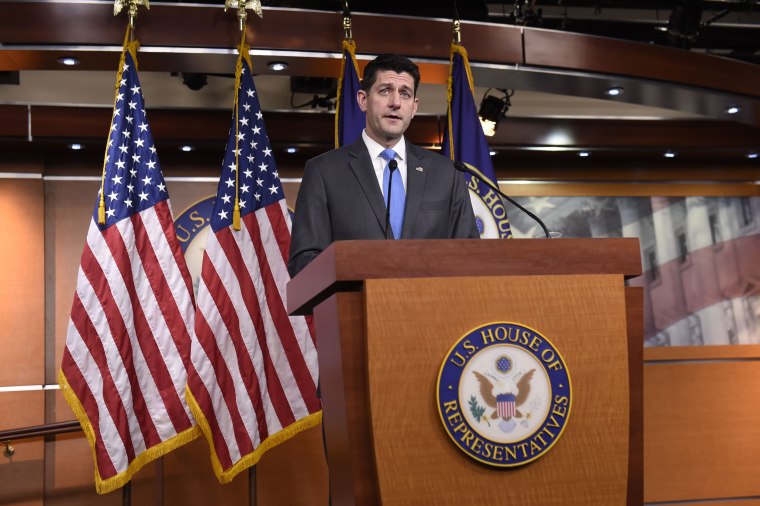In the end, the public's credulity ran out, and now Paul Ryan's tenure will, too. The Speaker of the House told fellow Republicans this morning that he will not seek reelection to his Wisconsin seat. The only question now, for both Republican leadership and the race in his own district, is how too-late he is for Republicans to keep control of the House.
Actually kicking over a trillion dollars upward to some of the wealthiest people on the planet because it fits within an untested ideology while gutting programs that have a decisive effect on people's lives — as they did on his, before he got to Washington — doesn't seem likely to help Republicans' chances in the fall. But it also demonstrated the problem with his reputation in Washington as a wonk.
His was a career that ambled across the gaps between ideology and reality like a cartoon character, incapable of falling because he was entirely indifferent to the chasm.
The label "wonk" affixed legitimacy to him in a way that the actual math of his policy prescriptions could not. His "ideas" were described in philosophical terms instead of concrete ones, a high-mindedness that vaulted past the coincidental, inconvenient and constant fact that gutting social programs that provide food and health care to the nation's most impoverished citizens increases the rate at which those people die prematurely.
He was a wunderkind because he used numbers when too many people don't understand math, even if his budgetary claim to fame had a $4.6 trillion hole in it, and his was a career that ambled across the gaps between ideology and reality like a cartoon character, incapable of falling because he was entirely indifferent to the chasm.
Fond of the story of his childhood's role in shaping his conservative principles, Ryan was always careful to omit that his family assets grew fat on government contracts and that his out-of-state tuition was paid for by Social Security. His experience in the private sector was shorter than this sentence, even as he trumpeted how much better the private sector was at everything (except employing him). In office, he called for tax cuts during surpluses and tax cuts during deficits, helping the government rack up debts that would later "need" to be offset by slashing social programs. He preached austerity while enjoying $350-a-bottle wine tabs.

But the abstractions of policy prescriptions become far less abstract when people with disabilities, some paralyzed from the waist down, are dragged from Representatives' offices by police in an effort to force Americans like Paul Ryan to confront the reality that government programs literally keep some people breathing.
But that doesn't mean that Republicans are willing to abandon political gamesmanship. CNN conservative chair warmer and former Congressman Jack Kingston already has already framed Ryan's departure in completely political terms: this "perplexes Dems as now they have no one to attack. Meanwhile Dems will have to defend #Pelosi."
Setting aside the idea that attacking Trump, not Ryan, has been a pretty reliable strategy for liberal Democrats, it does make it harder for some Democrats running in red states. Trump's rabid base makes running against him difficult, but running against Paul Ryan would have left Trump out of the equation. Gallup polling from this time last year showed Ryan almost equally as underwater as Nancy Pelosi, with a 36 percent favorable rating against a 49 percent unfavorable. Ryan's departure removes one GOP problem while leaving the Democrats with their own.
Ryan's departure removes one GOP problem while leaving the Democrats with their own.
But that formulation ignores two things: The first is that Democrat candidates (especially ones with more progressive platforms and/or tossup districts) show more willingness to cast Pelosi aside, perhaps confident that new leadership can pick up new momentum without losing Pelosi's institutional memory and guidance.
The second is that someone actually has to replace Paul Ryan as speaker, if Republicans manage to maintain their majority in the House.
At present, the two leading candidates are House Majority Leader Kevin McCarthy, R-Calif., and House Majority Whip Steve Scalise, R-La. Either has all of the charm of Paul Ryan without the fog of garbage math that gives the illusion of fiscal substance.
With Scalise (who, granted, survived a shooting last year, and garnered more public sympathy than at any other point in his life), you have a guy who’s openly palled around with white supremacists. It adds nothing to the ticket — another white supremacist-adjacent GOP leader in the Trump era is a redundancy — while replacing Ryan's urbanity with the thing it was supposed to mask. Even the thickest Democratic message drone can start with something like, "If you enjoyed Paul Ryan's anti-poor-people agenda that ignored its disproportionate effects on people of color, you're going to love Steve's speeches to white supremacists!"
Someone actually has to replace Paul Ryan as speaker, if Republicans manage to maintain their majority in the House.
Threading the criticism needle takes more care with McCarthy, but he is just as unlikable. His last feint at the speakership got torpedoed when he admitted that the party manipulated due process to depress an opponent's poll numbers. "Everybody thought Hillary Clinton was unbeatable, right?" he told Sean Hannity. "But we put together a Benghazi special committee. A select committee. What are her numbers today? Her numbers are dropping."
And then there's his relationship with the still-unpopular Trump, who refers to McCarthy as "my Kevin." It's easy to see why; just pull up the tape of Trump's open White House meetings, where McCarthy sits off to the side, swallowing whatever Trump says before unctuously leaning in to correct him occasionally. Ryan might have been a gutless revanchist, but at least he wasn't a toady.
And then there's the party's other problem: Ryan's retirement leaves only one Republican candidate left running in his district — Paul Nehlen, another white supremacist who Republicans will surely be stunned to discover felt at home in their party for some reason.
At some point, someone should sit down to seriously question why people like Nehlen choose to run as Republicans and what it means for the party, but the middle of a Democratic-wave election isn't it. Assuming another Republican challenger doesn't appear, he'll need a talking-to from someone who he can understand. If Kevin McCarthy becomes House Speaker, Steve Scalise will have plenty of time.
Jeb Lund is a former political columnist, reporter and editor for Rolling Stone, The Guardian and 50 States of Blue. He has a podcast called This Week In Atrocity.

